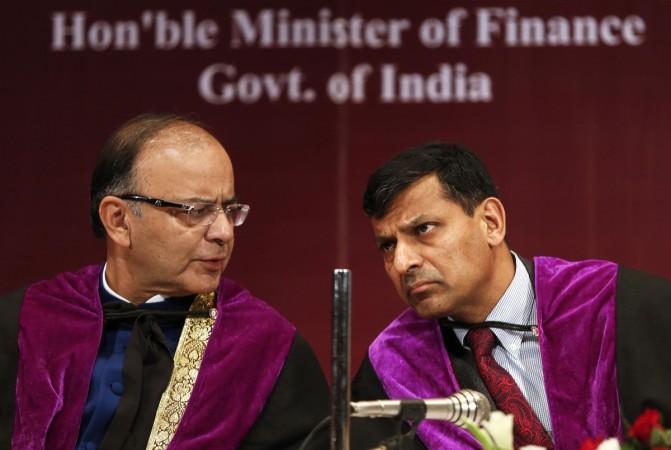Finance minister Arun Jaitley and Reserve Bank of India (RBI) Governor Raghuram Rajan on Friday shared a stage, extending support to each other, underscoring their unity and commitment on key issues ahead of the announcement of the next monetary policy and the budget in late February.

Prime Minister Narendra Modi's government is expected to announce major reforms during the budget session, hoping to revive a high-growth phase of economic activity.
Rajan had indicated in December that a rate-cut is likely before the RBI board reconvenes on 2 February, though experts expect him to hold back from a rate cut, until the Budget session makes the government's financial position clear.
Rajan has indicated that a mid-cycle rate cut is also possible, if inflation continues to remain low.
Public Sector Banking Independence
At the Gyan Sangam held on 2 and 3 January, Modi pledged to not interfere with the running of state-owned banks and asked them to operate with a business mindset. The finance ministry organised the banking retreat, to strategise on reviving state-run banks laden with severe debt. The retreat was attended by Jaitley, Rajan, heads of state-owned banks and other officials.
Welcoming Modi's stand, Rajan called it a 'landmark statement,' adding that the measure enshrines protection of strong commercial decision-making by banks, independent of political interference, which will improve the quality of debt.
Institution Building and Think Tanks
The finance minister spoke on the need to build institutions and protect and strengthened them, to act as 'think tanks,' dedicated to handling issues and idea generation in almost every sphere of activity, calling for enhanced scholarships, reported The Economic Times.
Last week, the government introduced the Niti Aayog, to replace the Planning Commission. Niti Aayog will function as a think tank to draft a development agenda within the framework of 'cooperative federalism.' On the same theme, Rajan noted that 'institutions often have strong public builders,' noting the importance played by men like Verghese Kurien – milk cooperatives, TN Seshan for the Election Commission and Vinod Rai for strengthening the voice of the Comptroller & Auditor General.
Though there could be disagreements on the details, methods and processes the institution builders followed, there was no dispute that they contributed to stronger institutions, helping strengthening the pillars of the democracy and economy, added Rajan, addressing students at the Indira Gandhi Institute of Development Research in Mumbai.
Mutual Respect
The bonhomie between the finance minister and the RBI Governor ruled out any speculation of a growing distance between the two power centres, over Rajan's unwillingness to cut rates to spur growth.
"The India of 2013 is different from the India of the seventies. These changes are going to significantly impact our lives," noted Jaitley.
Swaach Bharat
Endorsing Modi's Swachh Bharat programme, Rajan termed the move important for India and its people, stressing it was not only about the notion of cleanliness but also about the public spirit.
Swaach Bharat is also about mental cleanliness, intellectual cleanliness, spiritual cleanliness, added Rajan, "the notion that 120 crore Indians come together with a focus on public spirit, there is no force that can stop us from doing what we want."















